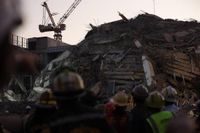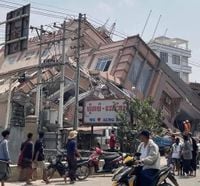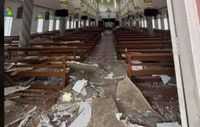On March 28, 2025, a devastating magnitude 7.7 earthquake struck central Myanmar, causing widespread destruction and prompting urgent calls for international aid. The tremor, which occurred at approximately 6:20 GMT, was centered about 16 kilometers northwest of Sagaing, at a depth of 10 kilometers. Tremors were felt as far away as Bangkok and Chiang Mai in Thailand, indicating the earthquake's significant impact.
According to the U.S. Geological Survey, the earthquake's epicenter was located approximately 17 kilometers from Mandalay, Myanmar's second-largest city, which has a population of about 1.2 million. Reports indicate that the earthquake has caused severe damage to houses, places of worship, and cultural sites across the affected regions, including Naypyidaw, the capital.
As the dust settles, the Burmese military junta has reported at least 200 fatalities and around 730 injuries due to the earthquake. This alarming toll underscores the dire situation in a country already grappling with a humanitarian crisis stemming from ongoing conflicts. Following the earthquake, the junta declared a state of emergency in six regions: Sagaing, Mandalay, Magway, Shan, Naypyidaw, and Bago.
In a rare move, the military government has made an unusual appeal for international assistance, highlighting the urgent need for aid in the wake of this disaster. The junta has also issued an "orange alert" due to the expected casualties and economic losses associated with the earthquake. Tom Fletcher, head of the United Nations Office for the Coordination of Humanitarian Affairs (OCHA), stated that crisis teams are responding swiftly to the situation, as local media reports suggest that hundreds may have died.
Amidst the chaos, the Indian Prime Minister Narendra Modi announced that India is prepared to assist Myanmar and Thailand, expressing concern for the well-being of those affected. "I am worried about the situation after the earthquake in Myanmar and Thailand. I pray for the safety and welfare of all. India is ready to offer all possible assistance," Modi wrote on social media.
In Myanmar, the earthquake has exacerbated an already critical humanitarian crisis, with over three million people displaced due to armed conflict since the military coup in 2021. Joe Freeman, a researcher with Amnesty International, noted, "This earthquake could not come at a worse time for Myanmar. More than one-third of the population will need humanitarian aid this year." He emphasized that the military's ongoing repression complicates the situation, as access to information and independent media is severely restricted.
Freeman further stated, "In a country where the military has banned numerous media outlets and restricted internet access, we may not have a clear picture of the extent of the damage and losses for some time. The fact that more images and information seem to be coming from Thailand than from the epicenter in Myanmar is a chilling reminder of the repression that the military has imposed on press freedom since the coup in 2021."
The aftermath of the earthquake has revealed extensive devastation. Witnesses in cities like Naypyidaw and Mandalay reported numerous damaged buildings, with a rescue worker indicating that they lack the necessary resources to search through the rubble. Additionally, local humanitarian sources have reported collapsed buildings, destroyed bridges, and a monastery where 20 children were trapped.
As the international community rallies to provide support, humanitarian organizations, including World Vision and Christian Aid, are mobilizing to reach victims in the hardest-hit areas. The need for immediate assistance is critical, particularly for vulnerable populations, including children, the elderly, and individuals with disabilities.
In Thailand, the earthquake's impact was also felt severely. The Prime Minister of Thailand, Paetongtarn Shinawatra, declared a state of emergency in the capital, where at least three people died, and more than 80 others were trapped after a 30-story building under construction collapsed. Reports from local authorities indicate that the earthquake has caused significant structural damage across the region, further complicating rescue and recovery efforts.
The extent of the devastation is still being assessed, with the Committee for Disaster Management in Myanmar yet to quantify the damage or provide a complete death toll. However, the urgency for aid and support is clear, as the region grapples with the compounded effects of natural disaster and ongoing conflict.
In light of the current situation, Amnesty International has called for the military to allow unrestricted access to humanitarian organizations and to remove administrative barriers that slow down the assessment of needs. The organization stresses that all parties involved in the armed conflict must prioritize the needs of the civilian population, ensuring that humanitarian assistance is provided without discrimination.
As the recovery efforts begin, the international community watches closely, hoping for a swift response to alleviate the suffering of those affected by this catastrophic event. The need for humanitarian aid is more pressing than ever, as Myanmar faces not only the aftermath of the earthquake but also the ongoing repercussions of political turmoil and conflict.







